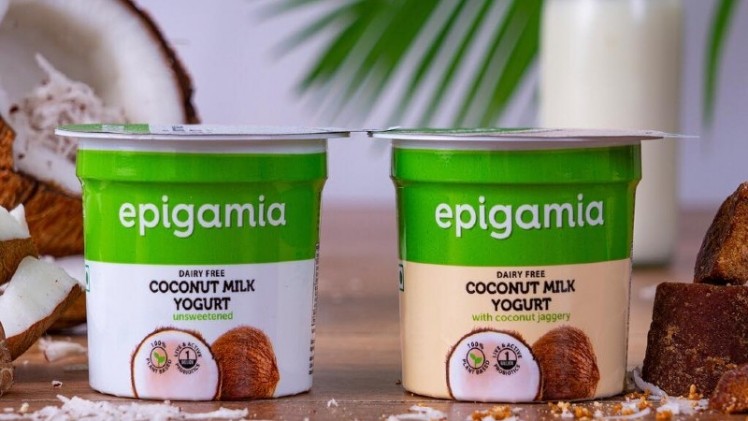India’s dairy transformation: Epigamia launches nation’s first branded coconut-based yoghurt

According to Epigamia Co-Founder and CEO Rohan Mirchandani, the firm aims to ‘contemporise’ the traditional dairy industry in India via a three-pronged approach: Brand, Product and Occasion.
“In terms of Product, we first did this by bringing in a Greek yoghurt range and modernising this by developing options such as lower sugar and fruit-flavours and are now hoping to do the same with our new plant-based range, to offer another alternative to traditional Indian yoghurt,” Mirchandani told FoodNavigator-Asia.
“We don’t want to preach to people what they should or should not eat as we are not scientists, but just want to give consumers more choices that are fresh and clean-label with no preservatives.
“So for this plant-based yoghurt, we wanted to make it such that it’s still a tasty healthy product for consumers to try whether or not they are vegan, and that’s why we have chosen coconut as the base to appeal to the larger mainstream crowd too – India loves coconut.”
In the initial launch, Epigamia’s coconut yoghurt will be available in two variants: Unsweetened plain, and flavoured with coconut jaggery.
“Jaggery is a very traditional Indian sweetener that we believe will hold mass local appeal, and moving forward we’re also looking at fruit flavours popular with locals such as Mango and Blueberry,” said Mirchandani.
“In Phase Two we will look at developing no-added sugar variants of the fruit flavours, and in Phase Three drinkable plant-based beverages – hopefully all within six to 12 months, then next year we can progress even further to working on high-protein variants or even with other types of plants.”
The fruity flavour concept is also very much in line with recent research from Mintel, which found flavour innovation to be an important factor for packaged yoghurts to compete with homemade variants.
As for Occasion, Mirchandani explained that in India yoghurts are commonly viewed as a food item to be eaten in accompaniment with heavy meals due to the digestive properties, and that Epigamia wanted to change this concept as well.
“Our aim is for the yoghurts to be viewed as foods that can be taken alone as snacks or after workouts and not necessarily just complementary to others,” he said.
As for brand, Epigamia’s entire concept is meant to be based on contemporisation and disruption – all the way down to the name of the firm.
“Epigamia is actually a Greek term that means the marriage of civilisations, once used in history when a war between Alexander the Great and the Morian Empire (now India) ended in a peace treaty,” he said.
“It is also meant to be a narrative about my experience being Indian but growing up in the United States – so basically, the idea is to symbolise how we as a firm are Indian in DNA, but global in our thinking.”
That said, Epigamia’s current focus for the next year or two will remain local in India, where the firm is building its own cold chain and supply chain capabilities to distribute in major cities nationwide.
“The bulk of our current business is in 10 cities – 80% of this business is from the five major cities of Delhi, Mumbai, Bangalore, Chennai and Hyderabad. The aim is to reach 40 to 50 cities at least, so we still have a very long way to go in India,” he said.
“Further down the line though, of course we want to go further – South Asia is a definite, and if we look East we definitely want to go to South East Asia, and when looking West then the Middle East.”
Epigamia is backed by some of the biggest names in the food and beverage industry such as Danone. It has 24 SKUs ranging from its well-known Greek yoghurt (six sweetened, three unsweetened flavours), Snack Packs (Greek yoghurt and granola), traditional Bengali lactose-free dessert Mishti Doi, Artisanal Curd (lactose-free curd dessert), Smoothies (drinkable Greek yoghurt) and three types of spreads.
Retail transformation in India post-COVID-19
Before COVID-19, Epigamia’s retail focus was spread across what Mirchandani deems the four segments of traditional Indian retail: Modern trade (supermarkets and hypermarkets), General trade (mom-and-pop shops), Alternate channels (hotels, schools, etc.) and E-commerce (bigger platforms such as Big Basket and Amazon).
After the pandemic outbreak, trade through the alternate channels dropped ‘drastically’ whereas e-commerce saw a boom – leading the firm to develop its own online platform, although its reach is currently limited to the five cities where its supply chain is strongest.
“We’ve recently launched our own direct-to-consumer platform due to COVID-19 and the lockdown, and it’s really accelerated and taken off – this was really crucial for us as no one knows when things will be back to normal,” said Mirchandani.
The challenges are still very real though – the ‘uncertainty of trade’ due to lockdowns in cities still remains an issue, where these could prevent orders from being delivered even after the products have been manufactured, risking wastage and loss.
“These are all fresh products and we don’t use any preservatives, so uncertainty as to whether an order can be fulfilled after products are produced is a worry,” he said.










